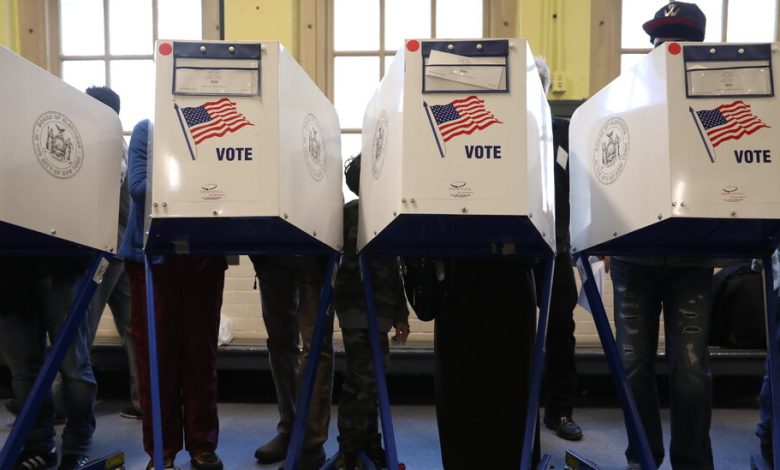Man Who Spread Misinformation on Trump’s Behalf Sentenced to 7 Months

A digital-age dirty-trickster who used Twitter posts that looked like Hillary Clinton ads to spread false information before the 2016 presidential election was sentenced on Tuesday to seven months in prison.
During a trial last spring, prosecutors presented evidence that the man, Douglass Mackey, had joined private Twitter groups where participants reveled in using lies and deceit on behalf of Donald J. Trump, carrying out what one participant termed “the deep psyops of meme war.”
Much of that activity was protected by the First Amendment, prosecutors said. But they argued that Mr. Mackey committed a crime days before the election when, using the name Ricky Vaughn, he posted images targeting Black and Latino voters that claimed it was possible to vote by text message. The idea, prosecutors said, was to suppress votes for Mrs. Clinton.
One of the images showed a Black woman and another one had a message in Spanish. Both included logos resembling the Clinton campaign’s and fine print attributing them to “Hillary for President.”
Mr. Mackey, who was convicted in March of conspiring to deprive others of their right to vote, declined to address the court before his sentencing on Wednesday.
Before issuing his sentence, Judge Ann M. Donnelly, of Federal District Court in Brooklyn, said that Mr. Mackey had been “one of the leading members” of that conspiracy and that it had been “nothing short of an assault on our democracy.”
Mr. Mackey’s lawyer had asked in a memorandum to the judge that his client be spared prison, saying his offenses had consisted only of computer clicks.
In 2018, three years before he was arrested, Mr. Mackey started psychotherapy and decided to change his life, the lawyer, Andrew J. Frisch added, writing: “The Douglass Mackey who stands before the court for sentencing is not Ricky Vaughn of seven years ago.”
Prosecutors asked that Mr. Mackey be sentenced to six months to a year in prison. They wrote that any changes in his life were not because of regret, but because of his unmasking in 2018 as Ricky Vaughn, a notoriously hateful figure who boasted of leveraging a “troll army” and was included by M.I.T. Media Lab on a list of top election influencers.
Referring to Mr. Mackey’s actions as mere clicks minimized their impact, prosecutors said, because his “true power was his ability to spread messages to convert his clicks into tens of thousands more.”
Mr. Mackey’s trial provided a glimpse into a crass world in which far-right activists in Twitter groups called “War Room” and “Infowars Madman” sought to sow chaos and division with the goal of boosting Mr. Trump.
“I wanted to infect everything,” testified one participant, identified only as Microchip, who began cooperating with the F.B.I. in 2018 and pleaded guilty to a conspiracy charge related to his circulation of misinformation.
Evidence showed that participants discussed generating interest in emails stolen from the Clinton campaign by Russia; portraying Mrs. Clinton as a “warmonger”; and promoting the claim that she had “cheated” during the primaries to get supporters of Senator Bernie Sanders to “hate not just Hillary, but the Democratic Party itself.”
Mr. Mackey pushed the hashtag #WriteInBernie, evidence showed, and stated that women and naturalized citizens should not be allowed to vote. He also wrote that Black people were unintelligent and “gullible” and suggested spreading a hashtag, #NeverVote, in “Black social media spaces.”
On Twitter, the day after he posted the false voting meme showing the woman, prosecutors said, Mr. Mackey made his motive clear, writing that a key to a Trump victory would be to “limit black turnout.”



